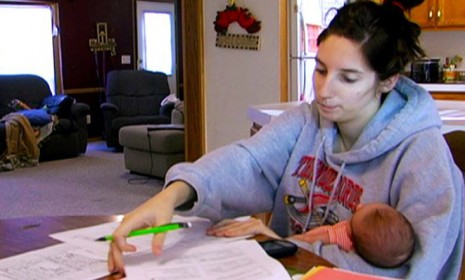America's sharp drop in teen births: 4 explanations
The teen birth rate has plunged 44 percent since 1991. What's behind the decline?

A free daily email with the biggest news stories of the day – and the best features from TheWeek.com
You are now subscribed
Your newsletter sign-up was successful
The teen birth rate in the United States has declined for the third straight year. From 2009 to 2010, the most recent year for which data is available, the U.S. birth rate among women aged 15-19 fell 9 percent, to 34.3 births per 1,000 women, an all-time low since data was first collected in 1946. According to the Centers for Disease Control and Prevention, the decrease was consistent across all racial and ethnic groups, although birth rates tended to be highest in the South and Southwest and lowest in the Northeast and Upper Midwest. Mississippi had the highest teen birth rate, with 55 births per 1,000 women, while New Hamphsire had the lowest rate at just under 16 per 1,000. Overall, the teen birth rate has fallen 44 percent since 1991. Here, four possible factors:
1. More teens are using more contraceptives
Teens are "doubling up" on birth control by using condoms and hormone treatments, Laura Lindberg of the Guttmacher Institute, a reproductive health center, tells U.S. News. "It's always hard to draw conclusions from any individual year, but the use of hormonal [birth control] increased significantly" from 2009 to 2010. These days, teens aren't taking any chances.
The Week
Escape your echo chamber. Get the facts behind the news, plus analysis from multiple perspectives.

Sign up for The Week's Free Newsletters
From our morning news briefing to a weekly Good News Newsletter, get the best of The Week delivered directly to your inbox.
From our morning news briefing to a weekly Good News Newsletter, get the best of The Week delivered directly to your inbox.
2. Sex ed is working
Some states, like California, push robust education that delves into safe-sex options. Others, like Texas, do the opposite, promoting abstinence until marriage. Both approaches seem to have had success. "In 1981 both states had a teen birth rate over the national average," says Francisca Ortega at the Houston Chronicle. And both states saw rates fall between 1981 and 2008: California's birth rate fell by 28 percent, while Texas' dropped by a commendable 16 percent.
3. TV shows about pregnant teens are terrifying kids
Shows like 16 and Pregnant and Teen Mom are giving kids a glimpse into the "difficulties of teen parenthood," says Anna North at BuzzFeed. Young people watching the less-than glamorous struggles of the MTV shows' stars seem to be deciding that they ought to be extra cautious.
A free daily email with the biggest news stories of the day – and the best features from TheWeek.com
4. The economy makes parenthood too costly
"Many social scientists agree that the economic downturn has made adults more reluctant to procreate," says North. "And some think it's had the same effect on teens." Teenagers are being more cautious as they realize the financial implications of having a child. Maybe, says Madison Park at CNN. But remember, the declining birth rate probably isn't due to any single factor. It's more likely a combination of several things.
Sources: Buzzfeed, CBS News, CNN, Houston Chronicle, U.S. News
-
 Gisèle Pelicot’s ‘extraordinarily courageous’ memoir is a ‘compelling’ read
Gisèle Pelicot’s ‘extraordinarily courageous’ memoir is a ‘compelling’ readIn the Spotlight A Hymn to Life is a ‘riveting’ account of Pelicot’s ordeal and a ‘rousing feminist manifesto’
-
 The EU’s war on fast fashion
The EU’s war on fast fashionIn the Spotlight Bloc launches investigation into Shein over sale of weapons and ‘childlike’ sex dolls, alongside efforts to tax e-commerce giants and combat textile waste
-
 How to Get to Heaven from Belfast: a ‘highly entertaining ride’
How to Get to Heaven from Belfast: a ‘highly entertaining ride’The Week Recommends Mystery-comedy from the creator of Derry Girls should be ‘your new binge-watch’